Ruqia Hassan: the woman who was killed for telling the truth about Isis
Page 1 of 1
 Ruqia Hassan: the woman who was killed for telling the truth about Isis
Ruqia Hassan: the woman who was killed for telling the truth about Isis
The 30-year-old Kurdish woman from Raqqa risked her life by openly criticising the regime on Facebook. Her friends, family and fellow activists remember her determination to tell the world the grim truth about life in Syria
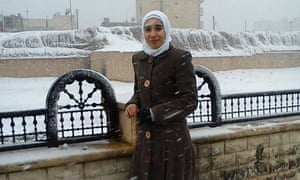
Ruqia Hassan, who was murdered in September 2015, pictured on her Facebook page. Photograph: Ruqia Hassan Facebook
In July 2015, Ruqia Hassan posted a message on her Facebook page: “Greetings to every girl celebrating Eid in her pyjamas!” It was the kind of dig her followers loved; a sarcastic acknowledgment that small pleasures – such as wearing new clothes on Eid – had become impossible since Raqqa, a small city on the north bank of the Euphrates river, had turned into the dark heart of the Islamic State. It was also the sort of comment that made Hassan’s family fear that she was attracting the wrong kind of attention. They were right: weeks later, she was arrested and imprisoned; two months later, she was dead.
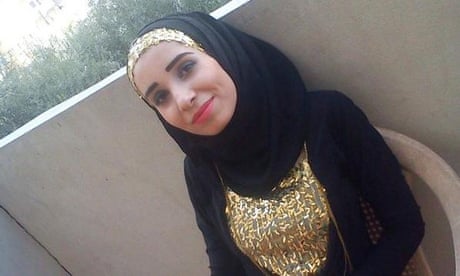
Journalist Ruqia Hassan murdered by Isis after writing on life in Raqqa
Read more
Family members say that, in person, the 30-year-old was shy and quiet. Yet on social media she showed no fear, documenting with brutal honesty life under Isis, and never attempting to hide her disgust for it. She posted under the name Nissan Ibrahim, and her Facebook page became a form of resistance that allowed her to expose the miserable conditions of the city, whose inhabitants are under attack from all sides; trapped by Isis’s vicious rule on the ground, pummelled by attacks from Assad’s regime, and hit from above with airstrikes by Russian and coalition forces.
Her posts could be bleak. “No one has shown us any compassion except the graveyards,” she wrote bitterly. “No one loves us like the graveyards.” Yet she also vividly captured the anxiety on the streets, as people tried to carry on with their lives in a warzone. “People in the market crash into each other like waves,” she noted, “not because of the numbers … but because their eyes are glued to the skies … their feet are moving unconsciously.”
Reporting on airstrikes, she vented her anger at those unleashing violence all around her. “Drone in the sky now – and we heard an explosion. May God protect the civilians – and take the rest.” Yet it was her outspoken references to Isis that worried her friends most. “Today [Isis police] launched random detentions … God, I beg you ... end this darkness and ... defeat these people.”
Hassan, a philosophy graduate from the University of Aleppo, was born and brought up in Raqqa. Before the uprisings in Syria, this modestly prosperous city had a friendly, smalltown feel, with a population closely tied to agriculture. It was a city where tradition, rather than religion, exerted a strong pull. By contrast, Hassan’s family, Syrian Kurds from a village close to the nearby city of Kobani, were devout and wealthy. Hassan’s father owned four brick factories, along with other properties in Raqqa, and went to the mosque every day to pray. He had two wives, so Hassan and her sister, a doctor, had five half-brothers.
According to Abu Mohammed, one of the founders of Raqqa is Being Slaughtered Silently (RIBSS), a group of activists committed to publicising the plight of the city, Hassan had joined protests against Bashar al-Assad’s regime, “from the earliest street demonstrations”. As the uprising spread, Raqqa became a magnet for tens of thousands of Syrians fleeing other cities, and, for a while, became known as the “hotel of the revolution”. By 2013, it was held by the Free Syrian Army (FSA) and Islamist groups such as Jabhat al-Nusra, al-Qaida’s franchise in Syria.
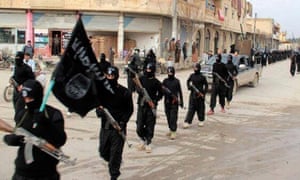
Facebook [url=https://twitter.com/intent/tweet?text=Ruqia Hassan%3A the woman who was killed for telling the truth about] Twitter [/url] Pinterest
Isis fighters marching in Raqqa in 2014. Photograph: AP
When al-Nusra began turning on the FSA, Hassan’s family were no longer safe. “When the first attacks on Raqqa took place, the Kurds were deported,” says her cousin Yehya Ali. “So Ruqia and her family came to Kobani and stayed in my family home with us for three months.” Abdullah (not his real name), another cousin, remembers her as intelligent and passionate. “Ruqia was a special girl. She was sensitive and felt the pain of the injustice. I teach philosophy and we sat for many nights discussing human nature and freedom.”
Eventually, Hassan’s mother, worried about losing their businesses, decided to return to Raqqa. “Her family was one of the very few Kurdish families who stayed,” Ali says. In 2014, Raqqa was conquered by Isis – and declared the capital of the so-called caliphate. Now foreign fighters and Isis supporters were flocking to the city – and for the hundreds of thousands of civilians trapped inside, it became a prison.
Like Hassan, Raheb Alwany, a 27-year-old doctor who fled to the UK a year ago, grew up in Raqqa. “I did not know Ruqia, but what she was doing was very brave, and very dangerous,” she says. “In Raqqa, when we were growing up, you could wear what you liked. People there always wanted to enjoy themselves – they loved going out with friends, people would fish or swim in the river. My friends and I would go to restaurant, cafes or just to walk in the [public] gardens.”
Under Isis, the atmosphere became stifling. “Everything changed. Women couldn’t go out without being covered in black abayas and niqabs – even their hands,” Alwany says. “All the shops had to close at prayer times. If you disobeyed the rules, the punishments were serious – you could be whipped, arrested or fined. I was the only woman working full time in the hospital, but they made it impossible for me.”
Sadistic executions, including crucifixions, took place on the city’s main roundabout. Cigarettes, music and, for women, travelling without a male guardian were outlawed. Schools were closed, and walls painted black. “Now it is so bad no one is even allowed to leave the city without permission,” Alwany says. “There are two options for the people who stay behind: try to avoid Isis, which makes life impossible, or give them your loyalty – just to survive.”
Hassan did neither. Instead, her criticisms grew fiercer. “Every day they ban ban ban ...” she wrote, mockingly. “I am waiting for the day that they finally permit something.” With journalists unable to access the city, documenting events in Raqqa was growing more important. In 2014, Hassan made contact with RIBSS, according to Abu Mohammed. While Hassan did not join their network of around 18 citizen journalists, she shared their aims. “She was interested to know about our project and what we do,” he says.
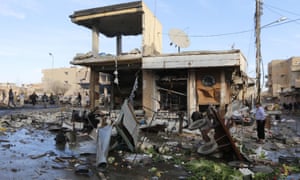
Facebook [url=https://twitter.com/intent/tweet?text=Ruqia Hassan%3A the woman who was killed for telling the truth about] Twitter [/url] Pinterest
Activists said this building in Raqqa was hit by airstrikes carried out by forces loyal to President Assad in 2014. Photograph: Nour Fourat/Reuters
By now foreign fighters had established themselves in the city. Life for civilians took on a nightmarish quality, but Isis began pumping out propaganda portraying it as a jihadi utopia. Foreign fighters, and women and girls who joined the terrorist group from the west, posted pictures of themselves drinking milkshakes, scoffing M&Ms and watching sunsets.
One British jihadi, Siddhartha Dhar, now calling himself Abu Rumaysah al Britani, released a jauntily written 47-page “brief guide to the Islamic state” last year, discussing the delicious food, educational facilities and global brotherhood to be found in Raqqa. “I cannot help but in the near future think we will be eating curries and chow meins on the streets of Raqqa,” he enthused, adding: “Astonishingly in Raqqa … citizens now have the fantastic opportunity to study medicine.”
That wasn’t how Hassan saw life in the city. “Today, a Tunisian fighter stopped me because of my Islamic dress code. I ignored her and walked away but I wished that I had a pistol to kill her. I wanted to stop this humiliation, these guys built their power on us. I’m sick of them and their power. I’m sick of being a second-class citizen. God, please help us.”
Opposing Isis’s views carried fatal risks. In May 2014, the first RIBSS journalist was killed in one of the city’s public squares. Other executions of those suspected of working for the group followed; their deaths filmed as a warning to others. Isis had little compunction about killing women; Abu Mohammed notes that the killing of the first female activist – Iman al-Halabi – came in 2013. Despite this, Hassan would not be silenced.
“The only thing the secular man remembers from the Qur’an is that God is the most merciful, and everything comes from that,” she wrote. “The only thing the extreme Islamists memorise is one verse – to be tough with infidels and merciful to believers – but to the extreme Islamists, everyone is an infidel, whether Muslim or not.”
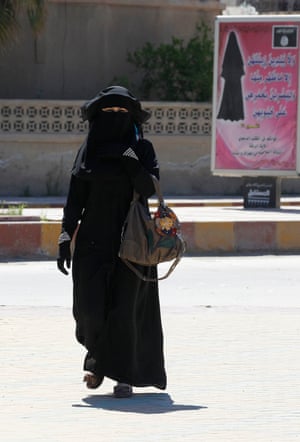
Facebook [url=https://twitter.com/intent/tweet?text=Ruqia Hassan%3A the woman who was killed for telling the truth about] Twitter [/url] Pinterest
In Raqqa, a woman walks past a billboard that carries a verse from Qur’an urging women to wear a hijab. Photograph: Reuters
Abu Mohammed says he cannot imagine a good ending to the situation in Raqqa. “We fear that the destruction of the city is inevitable,” he says. “People from Raqqa have nowhere to flee. They are surrounded by other Isis cities, the regime, or the Kurds.”
At times, Hassan herself seemed to grow weary of the complexities of the situation. “If we don’t want Daesh, or the coalition to attack Isis, and we don’t want the Free Syrian Army to come and fight Isis,” she asked, “then what do we want?” As airstrikes began in the city, Isis increased its control of internet access – forcing even its own fighters to use internet cafes so they could be monitored. Raqqa’s isolation increased, with inhabitants unable to check on the welfare of their families and friends elsewhere. Hassan tried to remain sanguine: “We are crying about the internet, but in Aleppo they are crying about water,” she wrote, before joking: “Go ahead and cut off the internet, our messenger pigeons won’t complain.”
“I personally tried to warn her before her arrest,” says Abu Mohammed. “I passed a message to her through friends, telling her to be more careful and post things in a different name and without any picture of her.” Yehya Ali tells a similar tale. “I didn’t like what she was posting,” he says. “I warned her many times that she will be targeted, but she became upset at me, and deleted me from her Facebook. She was stubborn and wanted to show the truth of what is happening, no matter what the cost.” Her cousin Abdullah also spoke to her. “She told me that she doesn’t care if Isis take her life,” he says. “[She said] that life is worthless without freedom and without dignity.”
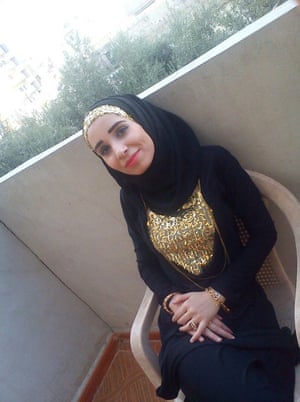
A photograph of Ruqia Hassan posted on Twitter following news of her death. Photograph: Twitter
After Hassan’s arrest, her distraught family visited the prison every day, desperate for news. They were never allowed to see her. Rather than shutting down her Facebook page, the militia left it active to entrap her friends – at least five people are thought to have been arrested as a result, according to Abu Mohammed. Months would pass before the family learned of Hassan’s fate. “We hoped that she would be released,” says Ali. “But on New Year’s Day her brother went to see Isis again; they told him they had executed her and five other women. They wouldn’t give the family her body.”
Since then, Hassan’s cousins have been unable to contact the family in Raqqa. In her last Facebook post, Hassan wrote: “I’m in Raqqa and I received death threats. When Isil arrest me and kill me it’s OK, because [while] they will cut [off] my head I will have dignity, which is better than living in humiliation.”
Abdullah says he hopes his cousin will be an inspiration. “She taught many people a lesson they would never forget. She taught us not to fear the tyrant ... I’m sure we will have many other Ruqias from now.”
Ali, too, could not be prouder of his cousin. “She become a hero in our village for her courage and being the voice of the truth. She was fearless ... A little Kurdish girl from Kobani faced a brutal militia and exposed them. She will never be forgotten.”
http://www.theguardian.com/world/2016/jan/13/ruqia-hassan-killed-for-telling-truth-about-isis-facebook
People forget, the majority of victims of ISIS are Muslim. Poor girl

Ruqia Hassan, who was murdered in September 2015, pictured on her Facebook page. Photograph: Ruqia Hassan Facebook
In July 2015, Ruqia Hassan posted a message on her Facebook page: “Greetings to every girl celebrating Eid in her pyjamas!” It was the kind of dig her followers loved; a sarcastic acknowledgment that small pleasures – such as wearing new clothes on Eid – had become impossible since Raqqa, a small city on the north bank of the Euphrates river, had turned into the dark heart of the Islamic State. It was also the sort of comment that made Hassan’s family fear that she was attracting the wrong kind of attention. They were right: weeks later, she was arrested and imprisoned; two months later, she was dead.

Journalist Ruqia Hassan murdered by Isis after writing on life in Raqqa
Read more
Family members say that, in person, the 30-year-old was shy and quiet. Yet on social media she showed no fear, documenting with brutal honesty life under Isis, and never attempting to hide her disgust for it. She posted under the name Nissan Ibrahim, and her Facebook page became a form of resistance that allowed her to expose the miserable conditions of the city, whose inhabitants are under attack from all sides; trapped by Isis’s vicious rule on the ground, pummelled by attacks from Assad’s regime, and hit from above with airstrikes by Russian and coalition forces.
Her posts could be bleak. “No one has shown us any compassion except the graveyards,” she wrote bitterly. “No one loves us like the graveyards.” Yet she also vividly captured the anxiety on the streets, as people tried to carry on with their lives in a warzone. “People in the market crash into each other like waves,” she noted, “not because of the numbers … but because their eyes are glued to the skies … their feet are moving unconsciously.”
Reporting on airstrikes, she vented her anger at those unleashing violence all around her. “Drone in the sky now – and we heard an explosion. May God protect the civilians – and take the rest.” Yet it was her outspoken references to Isis that worried her friends most. “Today [Isis police] launched random detentions … God, I beg you ... end this darkness and ... defeat these people.”
Hassan, a philosophy graduate from the University of Aleppo, was born and brought up in Raqqa. Before the uprisings in Syria, this modestly prosperous city had a friendly, smalltown feel, with a population closely tied to agriculture. It was a city where tradition, rather than religion, exerted a strong pull. By contrast, Hassan’s family, Syrian Kurds from a village close to the nearby city of Kobani, were devout and wealthy. Hassan’s father owned four brick factories, along with other properties in Raqqa, and went to the mosque every day to pray. He had two wives, so Hassan and her sister, a doctor, had five half-brothers.
According to Abu Mohammed, one of the founders of Raqqa is Being Slaughtered Silently (RIBSS), a group of activists committed to publicising the plight of the city, Hassan had joined protests against Bashar al-Assad’s regime, “from the earliest street demonstrations”. As the uprising spread, Raqqa became a magnet for tens of thousands of Syrians fleeing other cities, and, for a while, became known as the “hotel of the revolution”. By 2013, it was held by the Free Syrian Army (FSA) and Islamist groups such as Jabhat al-Nusra, al-Qaida’s franchise in Syria.

Facebook [url=https://twitter.com/intent/tweet?text=Ruqia Hassan%3A the woman who was killed for telling the truth about] Twitter [/url] Pinterest
Isis fighters marching in Raqqa in 2014. Photograph: AP
When al-Nusra began turning on the FSA, Hassan’s family were no longer safe. “When the first attacks on Raqqa took place, the Kurds were deported,” says her cousin Yehya Ali. “So Ruqia and her family came to Kobani and stayed in my family home with us for three months.” Abdullah (not his real name), another cousin, remembers her as intelligent and passionate. “Ruqia was a special girl. She was sensitive and felt the pain of the injustice. I teach philosophy and we sat for many nights discussing human nature and freedom.”
Eventually, Hassan’s mother, worried about losing their businesses, decided to return to Raqqa. “Her family was one of the very few Kurdish families who stayed,” Ali says. In 2014, Raqqa was conquered by Isis – and declared the capital of the so-called caliphate. Now foreign fighters and Isis supporters were flocking to the city – and for the hundreds of thousands of civilians trapped inside, it became a prison.
Like Hassan, Raheb Alwany, a 27-year-old doctor who fled to the UK a year ago, grew up in Raqqa. “I did not know Ruqia, but what she was doing was very brave, and very dangerous,” she says. “In Raqqa, when we were growing up, you could wear what you liked. People there always wanted to enjoy themselves – they loved going out with friends, people would fish or swim in the river. My friends and I would go to restaurant, cafes or just to walk in the [public] gardens.”
Under Isis, the atmosphere became stifling. “Everything changed. Women couldn’t go out without being covered in black abayas and niqabs – even their hands,” Alwany says. “All the shops had to close at prayer times. If you disobeyed the rules, the punishments were serious – you could be whipped, arrested or fined. I was the only woman working full time in the hospital, but they made it impossible for me.”
Sadistic executions, including crucifixions, took place on the city’s main roundabout. Cigarettes, music and, for women, travelling without a male guardian were outlawed. Schools were closed, and walls painted black. “Now it is so bad no one is even allowed to leave the city without permission,” Alwany says. “There are two options for the people who stay behind: try to avoid Isis, which makes life impossible, or give them your loyalty – just to survive.”
Hassan did neither. Instead, her criticisms grew fiercer. “Every day they ban ban ban ...” she wrote, mockingly. “I am waiting for the day that they finally permit something.” With journalists unable to access the city, documenting events in Raqqa was growing more important. In 2014, Hassan made contact with RIBSS, according to Abu Mohammed. While Hassan did not join their network of around 18 citizen journalists, she shared their aims. “She was interested to know about our project and what we do,” he says.

Facebook [url=https://twitter.com/intent/tweet?text=Ruqia Hassan%3A the woman who was killed for telling the truth about] Twitter [/url] Pinterest
Activists said this building in Raqqa was hit by airstrikes carried out by forces loyal to President Assad in 2014. Photograph: Nour Fourat/Reuters
By now foreign fighters had established themselves in the city. Life for civilians took on a nightmarish quality, but Isis began pumping out propaganda portraying it as a jihadi utopia. Foreign fighters, and women and girls who joined the terrorist group from the west, posted pictures of themselves drinking milkshakes, scoffing M&Ms and watching sunsets.
One British jihadi, Siddhartha Dhar, now calling himself Abu Rumaysah al Britani, released a jauntily written 47-page “brief guide to the Islamic state” last year, discussing the delicious food, educational facilities and global brotherhood to be found in Raqqa. “I cannot help but in the near future think we will be eating curries and chow meins on the streets of Raqqa,” he enthused, adding: “Astonishingly in Raqqa … citizens now have the fantastic opportunity to study medicine.”
That wasn’t how Hassan saw life in the city. “Today, a Tunisian fighter stopped me because of my Islamic dress code. I ignored her and walked away but I wished that I had a pistol to kill her. I wanted to stop this humiliation, these guys built their power on us. I’m sick of them and their power. I’m sick of being a second-class citizen. God, please help us.”
Opposing Isis’s views carried fatal risks. In May 2014, the first RIBSS journalist was killed in one of the city’s public squares. Other executions of those suspected of working for the group followed; their deaths filmed as a warning to others. Isis had little compunction about killing women; Abu Mohammed notes that the killing of the first female activist – Iman al-Halabi – came in 2013. Despite this, Hassan would not be silenced.
“The only thing the secular man remembers from the Qur’an is that God is the most merciful, and everything comes from that,” she wrote. “The only thing the extreme Islamists memorise is one verse – to be tough with infidels and merciful to believers – but to the extreme Islamists, everyone is an infidel, whether Muslim or not.”

Facebook [url=https://twitter.com/intent/tweet?text=Ruqia Hassan%3A the woman who was killed for telling the truth about] Twitter [/url] Pinterest
In Raqqa, a woman walks past a billboard that carries a verse from Qur’an urging women to wear a hijab. Photograph: Reuters
Abu Mohammed says he cannot imagine a good ending to the situation in Raqqa. “We fear that the destruction of the city is inevitable,” he says. “People from Raqqa have nowhere to flee. They are surrounded by other Isis cities, the regime, or the Kurds.”
At times, Hassan herself seemed to grow weary of the complexities of the situation. “If we don’t want Daesh, or the coalition to attack Isis, and we don’t want the Free Syrian Army to come and fight Isis,” she asked, “then what do we want?” As airstrikes began in the city, Isis increased its control of internet access – forcing even its own fighters to use internet cafes so they could be monitored. Raqqa’s isolation increased, with inhabitants unable to check on the welfare of their families and friends elsewhere. Hassan tried to remain sanguine: “We are crying about the internet, but in Aleppo they are crying about water,” she wrote, before joking: “Go ahead and cut off the internet, our messenger pigeons won’t complain.”
“I personally tried to warn her before her arrest,” says Abu Mohammed. “I passed a message to her through friends, telling her to be more careful and post things in a different name and without any picture of her.” Yehya Ali tells a similar tale. “I didn’t like what she was posting,” he says. “I warned her many times that she will be targeted, but she became upset at me, and deleted me from her Facebook. She was stubborn and wanted to show the truth of what is happening, no matter what the cost.” Her cousin Abdullah also spoke to her. “She told me that she doesn’t care if Isis take her life,” he says. “[She said] that life is worthless without freedom and without dignity.”

A photograph of Ruqia Hassan posted on Twitter following news of her death. Photograph: Twitter
After Hassan’s arrest, her distraught family visited the prison every day, desperate for news. They were never allowed to see her. Rather than shutting down her Facebook page, the militia left it active to entrap her friends – at least five people are thought to have been arrested as a result, according to Abu Mohammed. Months would pass before the family learned of Hassan’s fate. “We hoped that she would be released,” says Ali. “But on New Year’s Day her brother went to see Isis again; they told him they had executed her and five other women. They wouldn’t give the family her body.”
Since then, Hassan’s cousins have been unable to contact the family in Raqqa. In her last Facebook post, Hassan wrote: “I’m in Raqqa and I received death threats. When Isil arrest me and kill me it’s OK, because [while] they will cut [off] my head I will have dignity, which is better than living in humiliation.”
Abdullah says he hopes his cousin will be an inspiration. “She taught many people a lesson they would never forget. She taught us not to fear the tyrant ... I’m sure we will have many other Ruqias from now.”
Ali, too, could not be prouder of his cousin. “She become a hero in our village for her courage and being the voice of the truth. She was fearless ... A little Kurdish girl from Kobani faced a brutal militia and exposed them. She will never be forgotten.”
http://www.theguardian.com/world/2016/jan/13/ruqia-hassan-killed-for-telling-truth-about-isis-facebook
People forget, the majority of victims of ISIS are Muslim. Poor girl
Guest- Guest
 Re: Ruqia Hassan: the woman who was killed for telling the truth about Isis
Re: Ruqia Hassan: the woman who was killed for telling the truth about Isis
Well considering you do not want the west to help, I hold people like you completely responsible for her death
Guest- Guest
 Re: Ruqia Hassan: the woman who was killed for telling the truth about Isis
Re: Ruqia Hassan: the woman who was killed for telling the truth about Isis
I want the West to help, I don't want them to bomb and kill more civilians, especially as Cameron has now admitted he lied about the 70,000 fighters there that would help, most of them being affiliated to Al Qeda.
Using your brain instead of bombs and cutting off their revenue would bring them down much faster and reduce their impact. Then you can start tackling other aspects.
Dropping food to the starving would be a better use of the aircraft, amazing how bombs could be mustered within minutes of the vote, but food takes so much longer.
Using your brain instead of bombs and cutting off their revenue would bring them down much faster and reduce their impact. Then you can start tackling other aspects.
Dropping food to the starving would be a better use of the aircraft, amazing how bombs could be mustered within minutes of the vote, but food takes so much longer.
Guest- Guest
 Re: Ruqia Hassan: the woman who was killed for telling the truth about Isis
Re: Ruqia Hassan: the woman who was killed for telling the truth about Isis
sassy wrote:I want the West to help, I don't want them to bomb and kill more civilians, especially as Cameron has now admitted he lied about the 70,000 fighters there that would help, most of them being affiliated to Al Qeda.
Using your brain instead of bombs and cutting off their revenue would bring them down much faster and reduce their impact. Then you can start tackling other aspects.
Dropping food to the starving would be a better use of the aircraft, amazing how bombs could be mustered within minutes of the vote, but food takes so much longer.
You just proved you do not want the west to help because bombing is required, to help defeat ISIS, being as you have no comprehension of strategy or tactics
So again it is because of people like you who appease as to why she is dead.
If we had sent troops in now, there is every possibility she would be alive
I place you and other regressives totally responsible for her death
Guest- Guest
 Re: Ruqia Hassan: the woman who was killed for telling the truth about Isis
Re: Ruqia Hassan: the woman who was killed for telling the truth about Isis
Bombing is required IN YOU OPINION, in the opinion of many others, it's making it worse. You are not the final judge, nor are you even A judge, you are simply one voice that has no more relevance than any other voice, no matter that your ego doesn't like that fact.
Guest- Guest
 Re: Ruqia Hassan: the woman who was killed for telling the truth about Isis
Re: Ruqia Hassan: the woman who was killed for telling the truth about Isis
sassy wrote:Bombing is required IN YOU OPINION, in the opinion of many others, it's making it worse. You are not the final judge, nor are you even A judge, you are simply one voice that has no more relevance than any other voice, no matter that your ego doesn't like that fact.
Again that shows you have no comprehension of strategy or tactics, i have studied strategy and tactics and strategic bombing is necessary
The thing that is wrong with people like you is you fail to greasp casulties are inevitable. You cannot find fight coinflicts with your hands tied behind your backs. It is left wing regressives that lose conflicts because they have absolutely no idea how to win, and place the most ridiculous restrictions on combatants. I am the judge in this situation because you have supported those who hate Israel and it is hezbollah that has surrounded the starving city and it is people like you that cause armies to fight with their hands tied behind their backs
You are completely responsible for her death
Guest- Guest
 Re: Ruqia Hassan: the woman who was killed for telling the truth about Isis
Re: Ruqia Hassan: the woman who was killed for telling the truth about Isis
You're as bad as Quill, you'll be teaching at Universities next in that little head of yours.
Guest- Guest
 Re: Ruqia Hassan: the woman who was killed for telling the truth about Isis
Re: Ruqia Hassan: the woman who was killed for telling the truth about Isis
sassy wrote:You're as bad as Quill, you'll be teaching at Universities next in that little head of yours.
So now insulting people with smaller heads, which is generally those who are African, which was one of the reasons used against them by racists, as if scientifically it made them inferior. Of course science has disproved this, but interesting you would use this.
Again as seen you have no comprehension of military warfare, you then deflect with infantile comments which just about sums you up and why people like you are why sadly this woman died
Guest- Guest
 Re: Ruqia Hassan: the woman who was killed for telling the truth about Isis
Re: Ruqia Hassan: the woman who was killed for telling the truth about Isis
Pat, pat. Be a good boy while I'm gone, I'll bring you back another dummy to spit.
Guest- Guest
 Re: Ruqia Hassan: the woman who was killed for telling the truth about Isis
Re: Ruqia Hassan: the woman who was killed for telling the truth about Isis
See more infantile comments. Nothing to counter my points, so what does sassy do.
Insult, it just proves how vile and evil you really are sassy and I do not need to do anything to show this, you do it all by yourself
Agaijn people like you with your regressive views and how you hinder how we should fight conflicts are the reason sadly this lady is now dead
Insult, it just proves how vile and evil you really are sassy and I do not need to do anything to show this, you do it all by yourself
Agaijn people like you with your regressive views and how you hinder how we should fight conflicts are the reason sadly this lady is now dead
Guest- Guest
 Re: Ruqia Hassan: the woman who was killed for telling the truth about Isis
Re: Ruqia Hassan: the woman who was killed for telling the truth about Isis
Where are all the young men who could have tried to take back Raqqa from the ISIS barbarians? Did they run off to Europe and start harassing European women?

Raggamuffin- Forum Detective ????♀️
- Posts : 33746
Join date : 2014-02-10
 Similar topics
Similar topics» Portsmouth teenager Mehdi Hassan killed fighting for Isis in Syria
» Telling the truth on forums.
» CNN Correspondent Removed for Telling the Truth
» BREXIT MOVIE: The moment of truth... and the film telling it...
» Telling the Truth About the IDF's Pivotal Role in Securing the Jewish Future
» Telling the truth on forums.
» CNN Correspondent Removed for Telling the Truth
» BREXIT MOVIE: The moment of truth... and the film telling it...
» Telling the Truth About the IDF's Pivotal Role in Securing the Jewish Future
Page 1 of 1
Permissions in this forum:
You cannot reply to topics in this forum
» TOTAL MADNESS Great British Railway Journeys among shows flagged by counter terror scheme ‘for encouraging far-right sympathies
» Interesting COVID figures
» HAPPY CHRISTMAS.
» The Fight Over Climate Change is Over (The Greenies Won!)
» Trump supporter murders wife, kills family dog, shoots daughter
» Quill
» Algerian Woman under investigation for torture and murder of French girl, 12, whose body was found in plastic case in Paris
» Wind turbines cool down the Earth (edited with better video link)
» Saying goodbye to our Queen.
» PHEW.
» And here's some more enrichment...
» John F Kennedy Assassination
» Where is everyone lately...?
» London violence over the weekend...
» Why should anyone believe anything that Mo Farah says...!?
» Liverpool Labour defends mayor role poll after turnout was only 3% and they say they will push ahead with the option that was least preferred!!!
» Labour leader Keir Stammer can't answer the simple question of whether a woman has a penis or not...
» More evidence of remoaners still trying to overturn Brexit... and this is a conservative MP who should be drummed out of the party and out of parliament!
» R Kelly 30 years, Ghislaine Maxwell 20 years... but here in UK...